AiW note: Leading up to the winner announcement of the AKO Caine Prize on Monday 18 July, we have been publishing a series of Guest reviews of each of the stories shortlisted in 2022. We have also been sharing a new set of Q&As this week – hearing from the writers on the shortlist but also from the publishers of their stories, as well as judges who have determined the shortlist this year — with the aim of bringing forward some of the less visible avenues and labour involved in the literary prize. ![]()
Our accompanying Q&A today is with Letlhogonolo Mokgoroane (Judge 2022).
 In the last of our shortlisted author Q&As in the series this week, we had the pleasure of speaking with writer, artist, and editor Billie McTernan.
In the last of our shortlisted author Q&As in the series this week, we had the pleasure of speaking with writer, artist, and editor Billie McTernan.
McTernan’s practice “considers ways of expanding the possibilities of writing by experimenting with form” (http://billiemcternan.com/), and her non-fiction writing covers a wide range – arts, travel, political and cultural affairs – with a focus on Ghana and West Africa.
She talks about this with us here – her various writing hats, work and practice, books and reading, along with the pre-lives of her shortlisted story, “The Labadi Sunshine Bar”…
![]()
AiW: Congratulations on being shortlisted for the 2022 AKO Caine Prize for African Writing, Billie. Thank you for your story and for talking with us.
Could you tell us a bit about the pre-lives of “The Labadi Sunshine Bar” and/or how it came about? Any stories of your story that you can share – perhaps something that our readers might not yet know about (or that they should or need to know)?
Billie McTernan: The story comes from Labadi – Ghana – really. That is the essential starting point, or pre-life – taking Labadi and some of the lives that you come across in and around the neighbourhood, and then imagining people’s stories, people that maybe I had seen or interacted with, and expanding the story from there. The neighbourhood itself has proximity to places where you might find a lot of sex workers at night. And there are spots that are mentioned in the story that do exist.
What is the earliest memory you associate with writing this story?
A tough one… It’s a few years back that we were approached to write the story now, but I would say that I lived in Labadi for a number of years and I used to have my desk so I was looking out a window. There’s a particular scene in “The Labadi Sunshine Bar” where I talked about how the sounds of Labadi were coming into the room:
“It was Friday. The sun had just laid itself to rest and Labadi was easing into the night’s life. The sounds of Afrobeats, hiplife, and reggae blasted through the neighborhood, sliding through the louvers, filling the room, and bending the walls until the entire space became a bubble” (101).
Maybe it wasn’t exactly this sound, but I do remember that feeling I had at the time of writing, when I was still living in that part of town.
What would you do differently if writing under a pseudonym?
Nothing springs to mind, really. It’s a good question though, because I can imagine that you might inadvertently hold yourself back with something, for whatever reason.
If I think about the question in terms of what would I do differently if I had more time, though, I would have been interested in expanding on a couple of elements of the story: for instance, Madame Joanna, her character for sure; and then additionally, perhaps, the relationship between Madame Joanna and Mr. Boakye, her regular client.
Could you tell us a bit about your (other) work — your writing and/or other kinds of work, roles, or more general and different sorts of professional hats you wear?
I also work as an editor. And my other writing, besides my fiction work, includes a lot of nonfiction, essay writing – a lot on the arts but also some essays that might fall in the genre of commentary, let’s say.
I think one thing that I’m interested in that flows through all my work is that I like to try to have my voice felt in whatever it is I’m writing. That’s hopefully something that comes across through the different kinds and forms of my work. As an editor and writer, that’s an important part of the work that I do. Equally, I try to ensure that whilst editing efficiently and well, the writer’s voice is as true as what they’re trying to put across with the content.
What would you change about how you work?
I think I have a pretty good work rhythm generally. I try to not be too hard on myself if things don’t come quickly and give myself the grace there. You read these things like,”this is this writer’s timetable of how they get stuff done”. But I don’t really have that way of working. Sometimes I feel I would get so much more done if I did, but I guess that’s just not me. I’m just not that way inclined.
Having said that, I do find that I might put other freelance work before my personal work. Less of that and a bit more balance, maybe — that could be something I could change.
Best or most surprising things (about said other work and hats)?
A really good thing that comes from the editing work that I do is when you know the writer is happy with the piece that has come out, that you’ve been able to craft together — you kind of win together. Their voice is there; your input is there; and it’s something that they feel is aligned with what it is that they were hoping for for themselves. That’s something that I enjoy.
And then as a writer in general – it’s the feeling of satisfaction at the end. Even though something’s not necessarily complete but you’re satisfied, like “You know what? Okay, this can go”. Recently, literally last week, I finally finished something that I had been working on for a while. I hadn’t been feeling too well, so it was getting put back and back. And then I finally finished it and that feeling of, “I’m actually content with this piece” – I do like that feeling.
What is the best investment you’ve made in your creative self?
Giving myself more time to do that kind of creative work. A few years ago, I left an almost full-time position to focus more on my other pursuits and I think that’s probably what I could say has been the best investment so far into myself, the work that I do now, and my various practices.
Please confess any and all creative tics, overuses, bad habits.
I think this is where the editor side comes in again. Sometimes I can try to over-cross the t’s and dot the i’s. It relates to that feeling of satisfaction I mentioned in the previous question, but that could probably count as one of my creative tics.
Tell us a bit about your bookshelves – how they are arranged vs. how you would like them to be arranged.
My bookshelves are not arranged. So how they are arranged is not [laughs].
How would I like them to be arranged..? More than anything it would be in ways that would better document or record the books I’ve read, what I felt and my thoughts about them, and what they were about. I do have a few of those in place at the moment, but that’s something that I would like to be able to do more efficiently.
I am particular in another way with my books that says something about their value to me, in that I am not super keen on lending them out. That might be changing a bit though, becoming less of a concern now. But I guess there’s the fear of them not coming back in the condition that I had loaned them out in.
What do you do often before/after reading?
When I finish reading something, I have to take my time. I might Google – a bit of backstory, maybe; something about the topic, if there’s a topic that can be Googled, for instance. I think this is just to expand it — so, that might be where the story ends, but where, how does it continue?
I don’t know if I do anything specifically before reading, but always in between I take my time, rather than jump from one straight into another.
What is the most serendipitous book-related thing that has happened to you? Perhaps a happy, weird accident that has occurred around books that you can share with us?
I remember when I was in my teens reading this book by Shay Youngblood called A Black Girl in Paris, and then about 10 years later, I was actually living in Paris. It wasn’t like the book’s story was my story, but I remember feeling like, “Oh wow, that’s me now. That title applies to me”. I don’t know how serendipitous it actually was — I mean, I had planned to move to Paris, but I didn’t plan to move to Paris because of that book. It just so happened — so that was the feeling of it, that moment of things coming together.
Finally, as a writer, reader, and/or otherwise in your working life, what are the most ethical and/or heart-lifting practices you’ve seen happening recently in your industry, perhaps particularly given our experiences over the last few/couple of years?
I just love to see more and more literary platforms, more and more people writing and contributing to those platforms, and the growing number of different kinds of stories. The celebration of that as well. That’s definitely something that I enjoy seeing.
I feel like technology has had such a big part to play in this too. Obviously, there was a time when reading was in hardcopy and as much as I love print, which I do, I definitely think that it can limit a lot of people’s opportunities and access. So while the internet and technology comes with its failures, people are being enabled by it. There’s so much more of a wider range and breadth of literature that we have access to, and that people are able to showcase.
This comes up as part of broader conversations I know, but it bears repeating: people have always been writing all sorts of things; now there’s the space to share those things more widely. That’s something that I feel good about.
![]()
Image and text c. of the AKO Caine Prize website
 Billie McTernan is a writer and artist who experiments with literary and visual art forms. She has an MFA from the Kwame Nkrumah University of Science and Technology in Kumasi, and has published many articles and essays from her travels in West Africa. As a storyteller, she is drawn to the ways that stories are manifested, be it through the body in dance and performance, or through literature, sound and visual arts. She has been published in TSA Art Magazine, ARTnews, Artsy, Financial Times Life & Arts, Contemporary And, ARTS.BLACK and other independent artist-run platforms. She is currently working on a piece that falls somewhere between a short story and a novel.
Billie McTernan is a writer and artist who experiments with literary and visual art forms. She has an MFA from the Kwame Nkrumah University of Science and Technology in Kumasi, and has published many articles and essays from her travels in West Africa. As a storyteller, she is drawn to the ways that stories are manifested, be it through the body in dance and performance, or through literature, sound and visual arts. She has been published in TSA Art Magazine, ARTnews, Artsy, Financial Times Life & Arts, Contemporary And, ARTS.BLACK and other independent artist-run platforms. She is currently working on a piece that falls somewhere between a short story and a novel.
Billie’s short story, ‘The Labadi Sunshine Bar’, has been shortlisted for the 2022 AKO Caine Prize. Read ‘The Labadi Sunshine Bar’ here.
![]()
Last week, as one of our five AiW Guest shortlist reviews, Nnaemeka Ezema from the University of Ibadan, Nigeria, reviewed Billie’s “The Labadi Sunshine Bar” for us. Read his review – “Victims and Prey: The Agency of the Body Merchants in Billie McTernan’s “The Labadi Sunshine Bar””- here.
You can also browse through our full series of “twinned” Q&As published this week – with the shortlisted writers, and their publishers, as well as the judges of the Prize – where the aim is to open up some of the less visible labour and work involved in the literary prize and see more of the contemporary routes by which we receive the work of African writing.
The Q&A accompanying Billie’s today is with Letlhogonolo Mokgoroane, South African lawyer and co-founder/host of The Cheeky Natives podcast, and AKO Caine Prize 2022 Judge.
On Monday, we ran a Q&A with Johanna Ingalls of Akashic Books, publisher of three of the five shortlisted stories this year, including Billie’s, in the volumes Accra Noir and Addis Ababa Noir (co-published in the UK with Cassava Republic Press).
Billie’s is the last of our shortlisted Author Q&As in the series, although we will hear from Okey Ndibe, chair of the judges, to come…
![]()
The 2022 AKO Caine Prize winner will be announced on July 18th. Head to the AKO Caine Prize website – http://www.caineprize.com/ – for more, and for details of the line-up of related events and author/publisher appearances.

And catch Billie later today – Friday 15th July – over on the Africa Writes UK IG:
![]()
Categories: Conversations with - interview, dialogue, Q&A

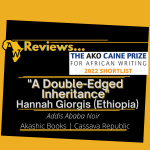


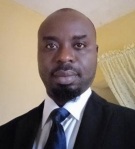
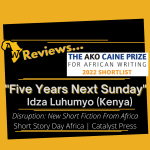


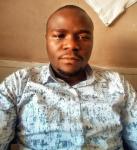

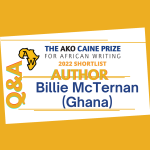



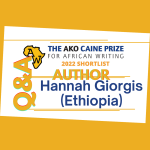





 Q&A: Koleka Putuma -Revolutionising the archive and (backspace) dancing… ‘Hullo, Bu-Bye, Koko, Come in’
Q&A: Koleka Putuma -Revolutionising the archive and (backspace) dancing… ‘Hullo, Bu-Bye, Koko, Come in’  Words on…Past & Present: The International Black Speculative Writing Festival (London & Remote)
Words on…Past & Present: The International Black Speculative Writing Festival (London & Remote)  Q&A: Publishing roundtable – #ReadingAfricaWeek
Q&A: Publishing roundtable – #ReadingAfricaWeek  Q&A: Words on… e-Kitabu – the Rights Café, Nairobi International Book Fair
Q&A: Words on… e-Kitabu – the Rights Café, Nairobi International Book Fair
join the discussion: